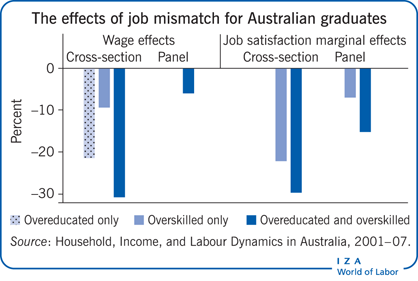Elevator pitch
There is evidence that many college graduates are employed in jobs for which a degree is not required, and in which the skills they learned in college are not being fully used. Most of the literature on educational or skill mismatch is based on cross-sectional data, providing information at just one point in time. Drawing meaningful conclusions about mismatch, its dynamics, and its relationship to wages, job satisfaction, and job mobility requires panel data, which can reach more nuanced conclusions by allowing for individual differences, e.g. choosing a job because it offers compensation.

Key findings
Pros
Many college graduates are employed in jobs for which a degree is not required, and in which the skills they learned in college are not being fully used.
Empirical analyses based on cross-section data suggest that overeducation is a sign of market failure.
These studies find a significant wage penalty and a reduction in job satisfaction for overeducated workers.
Cons
Some studies do not allow for individual differences or preferences; if overeducation is an investment in future earning power, mismatches are temporary and require no policy intervention.
Some choose to work in jobs for which they are overeducated since they offer compensating non-pecuniary advantages.
Panel data suggest no wage penalty for men who are overeducated or overskilled, and a small penalty for those who are both.
Overeducated workers find it easier to change jobs than overskilled workers or workers whose jobs and education are well matched.
Policymakers should focus on reducing the incidence of widespread overskilling, which reduces worker welfare and harms employers’ interests.